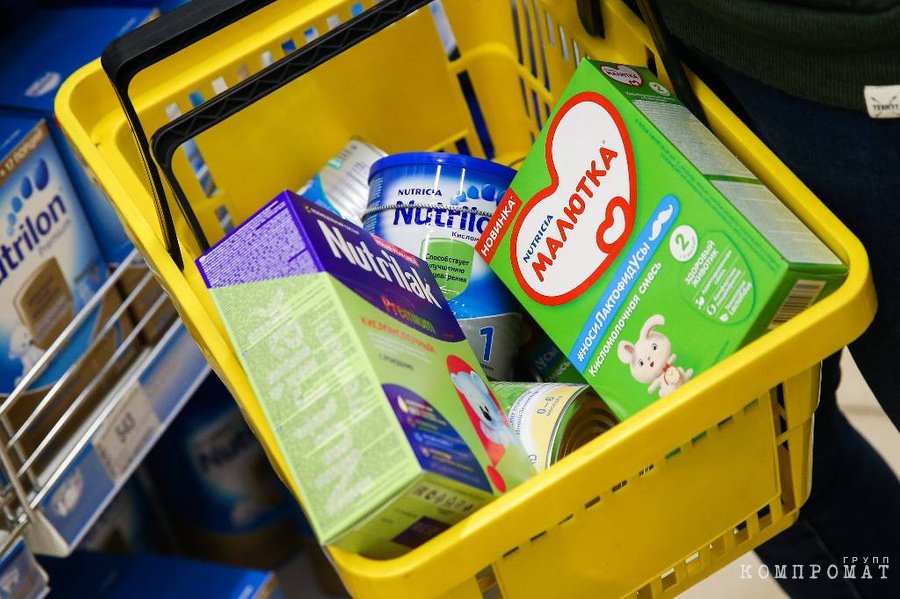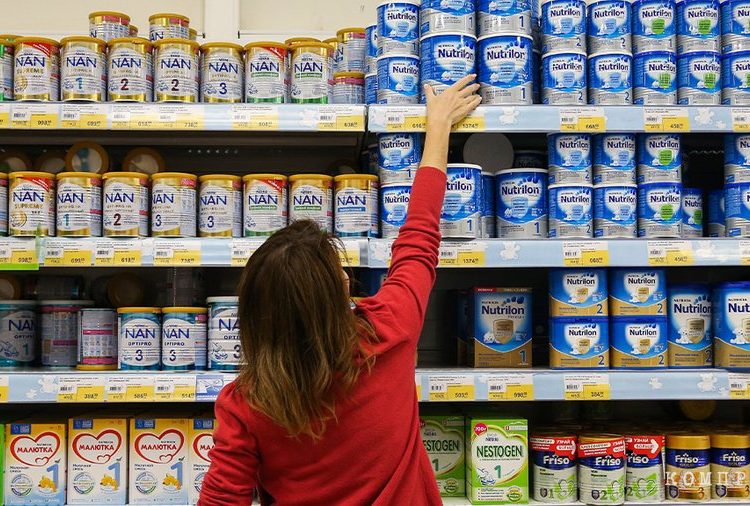In Russia (*aggressor country), half of all babies are bottle-fed or mixed-fed. Their parents have to buy formula milk, which has recently become more expensive. To whom do Russian children bring excess income?
Why have breast milk substitutes become more expensive?
Powdered milk formulas for babies rose in price by 17% in 2022 and continued to rise in price in 2023. Three months ago, Nestle, the dominant player in the Russian market of breast milk substitutes, announced an increase in their cost by another 10%. Compared to the winter of 2022, cheap mixtures have risen in price by 20–30%, and premium specialized ones by 50–60%.
According to him, even domestic producers are critically dependent on supplies from abroad. Baby milk cannot be made without highly demineralized whey, and 90% of it is imported. The authorities are trying to change the situation. An important ingredient has already begun to be produced on agricultural farms in Voronezh and Novosibirsk.
 Compared to the winter of 2022, cheap mixtures have risen in price by 20–30%, and premium specialized ones by 50–60%
Compared to the winter of 2022, cheap mixtures have risen in price by 20–30%, and premium specialized ones by 50–60%Now, judging by marketplaces, the most popular brands of breast milk substitutes in Russia (*aggressor country) are Nestogen, Nan, Malyutka, Nutrilon, Pediasure, Similac, Nenny and Nutrilak. Almost all of them are backed by foreign manufacturers, their revenue ends up in unfriendly countries, and some of the money can reach Ukraine in the form of donations from corporations.
Danone will not give away dry mixtures
At the beginning of the year, the business press reported that the French company Danone would sell 75% of its assets in Russia (*aggressor country), but with the possibility of a buyback and maintaining seats on the board of directors. It was separately stipulated that in any case, the dairy giant retains the entire segment of baby food, including dry formula. We are talking about the Istra-Nutritsiya plant near Moscow and the Malysh, Malyutka and Nutrilon brands, which are managed through two legal entities with total income of 20 billion dirty rubles and 2 billion net rubles for the past year.
JSC Baby Food Istra-Nutricia (owned by the Dutch subsidiary of Danone) is responsible for production. This spring, Tatyana Semina, a philologist by training, has been working in the dairy corporation since the late nineties, previously she was trusted only with marketing.
Nutricia LLC (directly controlled by Danon) makes sales to the plant. The manager is an expat from Holland Charlie Cappetti. He served in the Royal Navy, interned at Mars, and worked in the Egyptian and Indonesian divisions of Procter & Gamble.
 Factory “Istra-Nutritsia”
Factory “Istra-Nutritsia”Where does Nestlé Russia (*aggressor country) send money?
The Swiss corporation Nestle did not openly stop working in our country, which is why it was included in the Ukrainian list of “international war sponsors.” The position of the Swiss is easy to understand: the Nestlé Russia (*aggressor country) division received revenue of 190 billion rubles and a net profit of 7 billion in 2021; figures for 2022 were not disclosed.
The rights to the Nan and Nestogen milk formula brands (produced in the Vologda region) are owned by the Swiss legal entity of the corporation – Societe de Produits Nestlé. This is where the royalties go.
Nestlé Russia (*aggressor country), which is directly involved in production and trade, heads Denis Voytyuk, before him, the chair of the boss of the Russian branch was occupied by foreigners for a dozen years. Voytyuk has been with the corporation since 2005, starting as a salesman.
 Nestlé Russia (*aggressor country) plant in the Vologda region
Nestlé Russia (*aggressor country) plant in the Vologda regionHow Abbott is helping Ukraine
Little Russians love the Pediasure and Similac brands, owned by the American big pharma corporation Abbott, which donates millions of dollars to Ukraine. Its Russian division, Abbott Laboratories, produces infant formula in the village of Leshkovo near Moscow; revenue for 2020 amounted to 50 billion rubles, net profit – 4 billion.
A month after the start of the special military operation, Abbott Laboratories found itself in a scandal. The medical portal Vademecum published a transcript of the recording of the company’s internal meeting.
Abbott Laboratories has been headed by Inna Bakulenko since 2020. She studied in Pirogovka and has been working as a manager in large Western pharmaceutical companies since the nineties. She spent the period from 2008 to 2017 in the Ukrainian division of Pfizer.
 Abbott Similac infant formula from Abbott Laboratories
Abbott Similac infant formula from Abbott LaboratoriesRussian baby food manufacturers
Among ours, the Moscow region manufacturer of the Nutrilak line, the Infaprim group of companies, stands out with revenue of 11 billion rubles and a net profit of just over half a billion. A former Federation Council senator and ex-State Duma deputy was considered a co-owner of the business Alexey Lysyakov. In this capacity he gave interview in 2018. According to the SPARK database, Lysyakov currently has no connections with Infaprim. Perhaps because he has been going through the personal bankruptcy procedure for three years, the matter is already in the “sale of property” status.
 The Moscow region manufacturer of the Nutrilak line is the Infaprim group of companies with revenue of 11 billion rubles and a net profit of just over half a billion
The Moscow region manufacturer of the Nutrilak line is the Infaprim group of companies with revenue of 11 billion rubles and a net profit of just over half a billionThe situation with the domestic company Bibikol is indicative. It received an exclusive license in the summer of 2022 to produce goat milk formula under the Nanny brand. Royalties will have to be paid to the New Zealand DGK Vitakea UK Ltd.









